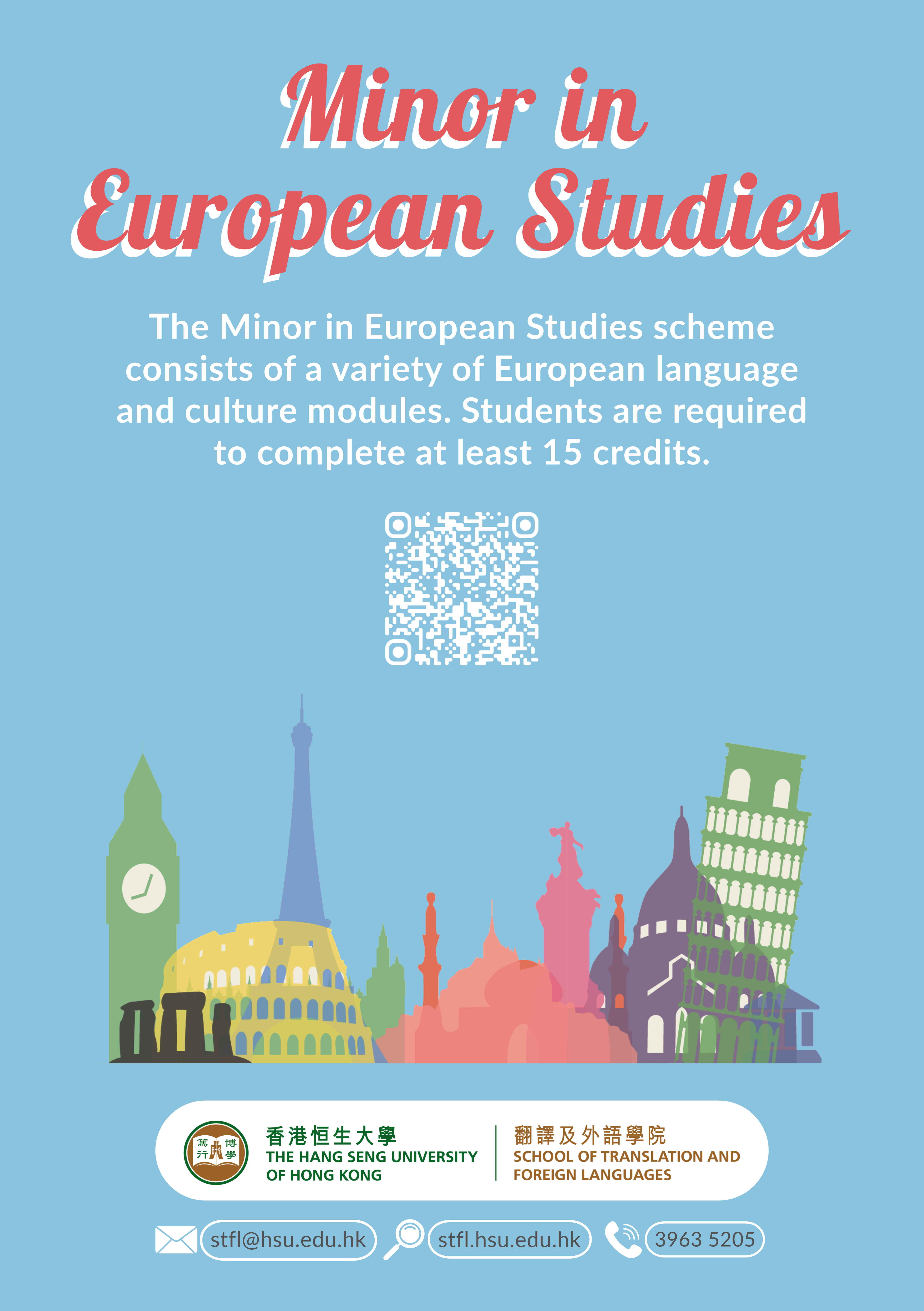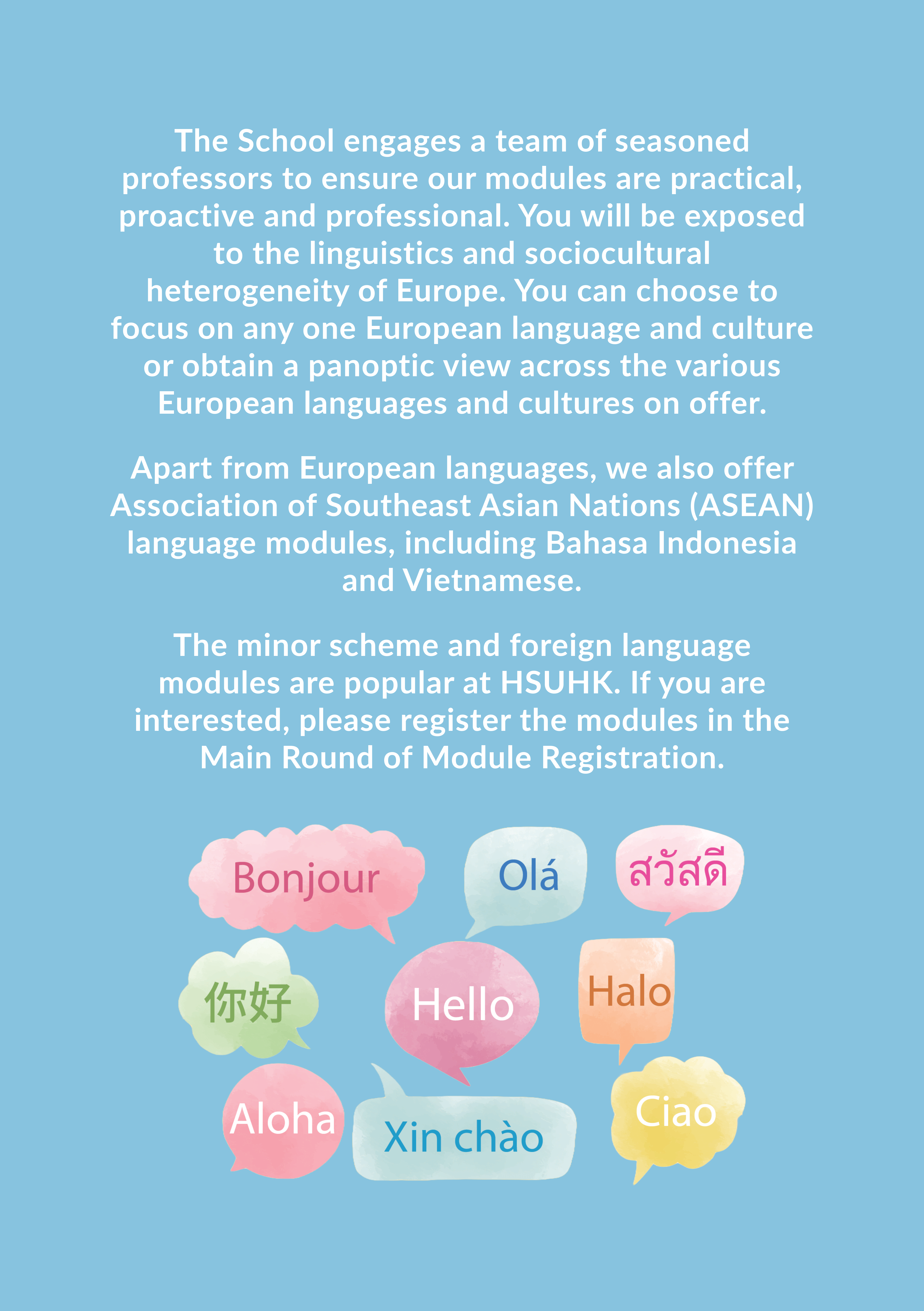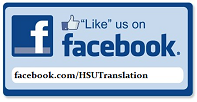Minor in European Studies
Minor in European Studies
The Minor in European Studies scheme consists of a variety of European language and culture modules. Students are required to complete at least 15 credits for fulfilment of the requirement of the Minor Programme.


| Module | Nature | Credit |
FLA3011 Europe vs European UnionYear of Study: 1, 2, 3, 4 Module Description This module illustrates how and why the European Union has developed from 1950 to the present day. A range of topics are covered, including the Union’s early history, the workings of its institutions and their functions, the Union’s impact on European countries, the interplay between “Eurosceptics” and federalists, as well as the role of the Union beyond Europe in international affairs. The module also examines the significance of the state of the single European currency–the Euro, and considers the future of the Union and the choices and challenges that lie ahead.Learning OutcomesUpon completion of the module, students should be able to:
|
Compulsory | 3 |
| A total of 12 credits of modules from the list below (at least 6 credits must be at level 3 or above):
FLA1101 German IYear of Study: 1, 2, 3, 4 Module Description This module is designed for students without prior knowledge of German. Students explore the basic features of the German language through interactive classwork and homework. German grammatical features and pronunciation are explained and practiced in depth. Learning Outcomes Upon completion of the module, students should be able to:
FLA1102 German IIYear of Study: 1, 2, 3, 4 *Students are required to complete a module prerequisite exemption form and then provide relevant supporting documents and attend a written placement test Module Description This module is designed for students who have successfully completed German I. Students continue to explore the features of the German language and have the opportunities to enlarge their actively-used vocabulary and employ moderately-complex sentence patterns. Students receive intensive practice in spoken and written German through interactive classwork and homework. Grammatical features are explained and practiced in depth. Students are also introduced to various aspects of the German culture. At the end of the semester, students are expected to have developed some basic rudimentary skills in reading, writing, listening and speaking German in work and daily life situations. Learning Outcomes Upon completion of the module, students should be able to:
FLA3101 German IIIYear of Study: 1, 2, 3, 4 *Students are required to complete a module prerequisite exemption form and then provide relevant supporting documents and attend a written placement test Module Description This module is designed for the students who have successfully completed German II. Students continue to explore the features of the German language and have the opportunities to enlarge their actively-used vocabulary and employ moderately complex sentence patterns. Students receive intensive practice in spoken and written German through interactive classwork and homework. Grammatical features from the first half of A1.2 level of the Common European Reference Framework are explained and practiced in depth. Students continue to be exposed to various aspects of the German culture. At the end of the semester, students are expected to have developed more solid skills in the four language domains: reading, writing, listening and speaking.Students should be able to communicate more confidently in a wider range of social interactions in work and daily-life situations. Learning Outcomes Upon completion of the module, students should be able to:
FLA1201 French IYear of Study: 1, 2, 3, 4 Module Description This module is designed for beginners who have little or no prior knowledge of French. It aims to help students develop rudimentary skills in reading, writing, listening and speaking French in daily life situations. Students are also introduced to various aspects of the French culture. At the end of the semester, students are expected to master some basic communication skills in order to deal in French in different types of situations. Therefore, some basic grammatical rules and vocabulary will be presented to students. Learning Outcomes Upon completion of the module, students should be able to:
FLA1202 French IIYear of Study: 1, 2, 3, 4 Module Description This course builds on the acquisitions of French I and aims at giving students the ability to conduct a simple conversation in French. To achieve this, a range of classroom activities will be proposed, in which active participation is expected. Basic pronunciation and grammar skills will also be taught. By the end of French 2, students should have reached the A1 level of the CEFRL (Common European Framework of Reference for Languages). Learning Outcomes Upon completion of the module, students should be able to:
FLA3201 French IIIYear of Study: 1, 2, 3, 4 Module Description This module builds on the acquisitions of French I & II and aims at giving students the ability to conduct a more complex conversation in French in various situation, including shopping and other private and professional contexts. To achieve this, a range of classroom activities are conducted, in which active participation is expected. Advanced pronunciation and grammar skills are also taught. After taking French III, students should have reached the A–A2 level of the CEFRL (Common European Framework of Reference for Languages). Learning Outcomes Upon completion of the module, students should be able to:
FLA1301 Spanish IYear of Study: 1, 2, 3, 4 Module Description This module is designed for beginners who have little or no prior knowledge of Spanish. It aims to help students develop rudimentary skills in reading, writing, listening and speaking Spanish in daily life situations. Students are also introduced to various aspects of the Spanish culture. At the end of the semester, students are expected to have acquired a basic understanding of the grammatical rules and principles of the Spanish language. Learning Outcomes Upon completion of the module, students should be able to:
FLA1302 Spanish IIYear of Study: 1, 2, 3, 4 *Students are required to complete a module prerequisite exemption form and then provide relevant supporting documents and attend a written placement test Module Description The module is designed for students who have completed Spanish I. It aims to help students develop rudimentary skills in reading, writing, listening and speaking in daily life situations. Students are also introduced to various aspects of Spanish culture e.g., work and friends. At the end of the semester, students are expected to have acquired a basic understanding of tenses and the usage of Spanish in daily life settings. Learning Outcomes Upon completion of the module, students should be able to:
FLA3301 Spanish IIIYear of Study: 1, 2, 3, 4 *Students are required to complete a module prerequisite exemption form and then provide relevant supporting documents and attend a written placement test Module Description The module is designed for students who have completed Spanish II. It aims to help students develop rudimentary skills in reading, writing, listening and speaking. Students are also introduced to various aspects of Spanish culture e.g., work and friends. At the end of the semester, students are expected to have acquired a basic understanding of tenses and the usage of Spanish in daily life settings. Learning Outcomes Upon completion of the module, students should be able to:
FLA3302 Spanish IVYear of Study: 1, 2, 3, 4 *Students are required to complete a module prerequisite exemption form and then provide relevant supporting documents and attend a written placement test Module Description The module is designed for students who have completed Spanish III. It aims to help students develop rudimentary skills in reading, writing, listening and speaking. Students are also introduced to various aspects of Spanish culture e.g., work and friends. At the end of the semester, students are expected to have acquired a basic understanding of tenses and the usage of Spanish in daily life settings. Learning Outcomes Upon completion of the module, students should be able to:
FLA1401 Italian IYear of Study: 1, 2, 3, 4 Module Description This Module is designed for beginners who have little or no prior knowledge of the Italian Language. It aims to help students to develop skills in reading, writing, listening and speaking Italian in daily-life situations. Students are also introduced to various aspects of Italian culture. At the end of the semester, students are expected to have acquired a basic understanding of the grammatical rules and principles of the Italian language and mastered communication skill in everyday life. They should be able to understand simple sentence (in oral and written form) and able to respond in accurate way. Learning Outcomes Upon completion of the module, students should be able to:
FLA1402 Italian IIYear of Study: 1, 2, 3, 4 *Students are required to complete a module prerequisite exemption form and then provide relevant supporting documents and attend a written placement test Module Description This Module is designed for students who have completed Italian I. It aims to help students to develop advanced skills in reading, writing, listening and speaking in daily life situations. Students are also introduced to various aspects of Italian culture. At the end of the semester, students are expected to have acquired a basic understanding of tenses and the usage of Italian in daily life settings. Learning Outcomes Upon completion of the module, students should be able to:
FLA1701 Finnish IYear of Study: 1, 2, 3, 4 Module Description This module will introduce basic knowledge of Finnish language and is designed for students with little or no previous experience in Finnish language. Students will explore the Finnish language and its properties through interactive classwork and homework, so that they will obtain basic level vocabulary and to gain confidence in pronunciation during basic communication level. Learning Outcomes Upon completion of the module, students should be able to:
FLA1702 Finnish IIYear of Study: 1, 2, 3, 4 *Students are required to complete a module prerequisite exemption form and then provide relevant supporting documents and attend a written placement test. Module Description This module is a continuation for the FLA1701, building on students’ basic communicational skills and confidence in Finnish language. FLA1701 or similar course is a prerequisite to this course. More study and work life essential vocabulary will be introduced. The students will explore Finnish language and its properties through interactive classwork and homework. The main objective is to strengthen the basic level vocabulary and to gain confidence in pronunciation during basic communication situations. Learning Outcomes Upon completion of the module, students should be able to:
FLA3111 Germany TodayYear of Study: 1, 2, 3, 4 Module Description If we look at what is considered typisch deutsch (typically German), we will find that the common definitions of what is “German” include many stereotypes and prejudices. This module aims at giving students an in-depth view on the cultural landscape of German speaking countries, with focus on Germany. This is achieved by examining the perception of Germany from abroad and within German-speaking countries, the geography of German speaking countries, the way Germans spend their leisure time, major German holidays and festivals, the German education system as well as modern and current German history, including the history of the German national anthem. The role that German women play in today’s German society is also be studied. Students explore and understand crucial aspects of modern German culture and society. They learn to understand the source of behaviour, customs and attitudes, while drawing comparisons between Germany, Hong Kong and mainland China. Learning Outcomes Upon completion of the module, students should be able to:
FLA3211 History of French FashionYear of Study: 1, 2, 3, 4 Module Description This module examines the history of French fashion from King Louis XVI to todays’ French fashion leaders. They include influential fashionistas Marie-Antoinette, Jeanne Lanvin, Coco Chanel, etc., who have contributed importantly to the establishment of La Haute Couture, which is the ultimate guarantor of the success and the prestige of the French fashion. Students are given a good understanding of the French fashion, which is not only a set of prestigious designers and brands, but also a French heritage built up by a group of geniuses who expressed their ideas and visions and changed society significantly. Learning Outcomes Upon completion of the module, students should be able to:
FLA3251 La Francophonie (1.5 credits)Year of Study: 1, 2, 3, 4 Module Description French is recognised as an official language of several global institutions, including the United Nations, NATO and the World Trade Organization. Learning Outcomes Upon completion of the module, students should be able to:
4. explore new ideas and potential actions to strengthen the French language. FLA3311 Latin America, Today!Year of Study: 1, 2, 3, 4 Module Description This module is designed to give an introduction to Latin American culture. The module covers cultural aspects of the daily life of Latin Americans by using films, artworks, textbooks and academic articles. This module aims at developing and widening student’s knowledge and understanding about the different Latin American countries and their culture. No prior knowledge is required. Learning Outcomes Upon completion of the module, students should be able to:
FLA3312 Spain, Today!Year of Study: 1, 2, 3, 4 Module Description This module aims to provide an overview of Spanish civilization on aspects related to history, arts, culture and society as the basis of the customs, attitudes and values of contemporary Spain. By considering culture as a social construct, students reflect on the difference between Spanish cultural values and those of Hong Kong. Students also develop an appreciation for great works of Hispanic fine art, architecture, music and literature. A variety of teaching materials will be used with a special emphasis on films. Learning Outcomes Upon completion of the module, students should be able to:
FLA3411 Introduction to Italian Renaissance ArtYear of Study: 1, 2, 3, 4 Module Description The period immediately following the Middle Ages in Europe, known as the Renaissance, saw a great revival of interest in the classical learning and values of ancient Greece and Rome. With political stability and prosperity, the development of new technologies and various advancements (printer press, a new system of astronomy, the exploration and the discovery of new continents) were accompanied by a blossoming of philosophy, literature, and art. The style of painting, sculpture, architecture, and decorative arts identified with Renaissance, emerged in Italy in the late 14th century; it reached the top at the end of 15th and at the beginning of 16th centuries, in the work of Italian artists such as Leonardo da Vinci, Michelangelo, and Raffaello. The module is designed as a one-semester examination of some the major and minor works of art, architecture, and sculpture in the Renaissance in Italy. Particular emphasis will be given to the social, intellectual, and historical content of the images produced during this important period of art history in Italy. Learning Outcomes Upon completion of the module, students should be able to:
FLA3711 Introduction to Scandinavia: History, Culture, and BusinessYear of Study: 1, 2, 3, 4 Module Description This module will allow students to get familiar with the Nordic countries: Sweden, Norway, Finland, Denmark, and Iceland. Students will work on different historical, cultural, geographical, societal and business approaches and hear from guest-lecturers on various contemporary topics, into which students are asked to look in depth in the form of project work. Learning Outcomes Upon completion of the module, students should be able to:
TRA1221 Thinking Through Translation (GE Cluster 1 module)Year of Study: 1, 2, 3, 4 Module Description This course invites students to explore the amazing world of translation by investigating the complex relationship between language, thought and culture from a translational perspective. It aims to develop students’ sensitivity of the cultural and philosophical issues surrounding language and translation. The focus is to reveal how translation shapes one’s world view, and how it will transform one’s own perspectives in the process. Learning Outcomes Upon completion of the module, students should be able to:
|
Elective | 12 |
|
Total |
15 | |

